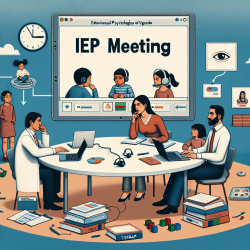As practitioners dedicated to creating positive outcomes for children, it is essential to stay informed about the latest research and integrate data-driven strategies into our practice. The study titled Reducing the Impact of Tinnitus on Children and Adolescents' Lives: A Mixed-Methods Concept Mapping Study offers valuable insights that can enhance our approaches to managing tinnitus in young patients.
Understanding the Research
The study involved 32 participants divided into two groups: adults who experienced tinnitus during childhood and clinicians who provide care for children with tinnitus. Through a concept mapping approach, the study identified 102 unique statements across four key concepts:
- Education, Support, and Counselling
- Support from Parents and Teachers
- Clinical Assessments and Management
- Self-Management Techniques
These concepts emphasize the importance of child-friendly and patient-centered care. Notably, adults who experienced tinnitus as children perceived many of the strategies as more beneficial than clinicians did, highlighting the need for a more empathetic and comprehensive approach.
Implementing Key Strategies
1. Education, Support, and Counselling
This largest cluster emphasizes understanding and addressing children's experiences with tinnitus. Effective strategies include:
- Providing child-friendly explanations and literature
- Ensuring children feel safe, supported, and reassured
- Teaching children methods to manage their responses to tinnitus
Adopting a family-centered care (FCC) approach can enhance outcomes by involving parents and caregivers in the management process, thereby reducing stress and improving follow-up rates.
2. Support from Parents and Teachers
Support from parents and teachers is crucial for managing tinnitus in children. Strategies include:
- Educating teachers about tinnitus and its impact
- Allowing adjustments to exams and class routines
- Providing consistent support and advocacy
By educating and involving school staff, we can create a more supportive environment that addresses the unique challenges faced by children with tinnitus.
3. Clinical Assessments and Management
Clinical care plays a significant role in managing tinnitus. Key strategies include:
- Conducting thorough hearing assessments and monitoring
- Providing tinnitus education to children and parents
- Making appropriate referrals to specialists
Clinicians should be trained to ask about tinnitus during hearing tests and to discuss it confidently with patients and their families, promoting hope and understanding.
4. Self-Management Techniques
While some children develop their own coping strategies, these can vary in effectiveness. Encouraging beneficial self-management techniques, such as sound enrichment and engagement in distracting activities, can help mitigate the impact of tinnitus.
Encouraging Further Research
While the study provides a comprehensive framework for managing tinnitus in children, it also highlights areas where further research is needed. Understanding the long-term effectiveness of these strategies and exploring new interventions can help refine our approaches and improve outcomes for young patients.
To read the original research paper, please follow this link: Reducing the Impact of Tinnitus on Children and Adolescents' Lives: A Mixed-Methods Concept Mapping Study.










